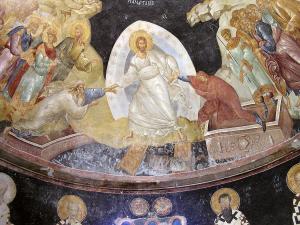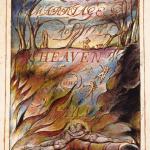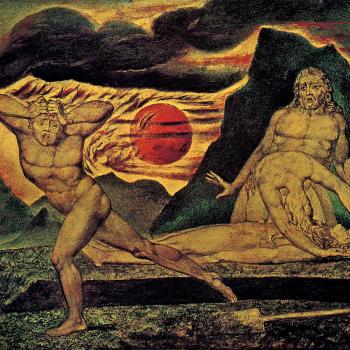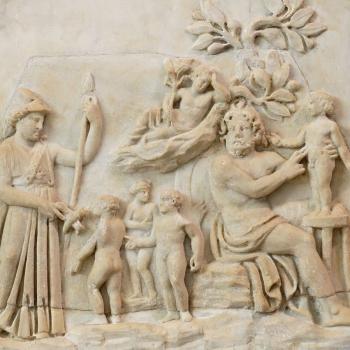
Shakespeare’s Prince Hamlet pondered the fundamental existential question of whether to live or die: “To be or not to be? That is the question.” One might think of whether to live or cease to live as a Christian in the following way: “To capitulate or recapitulate? That is the question.” This post reflects upon the Christian doctrine of recapitulation and its import for the Christian life.
I asked my theology students to recall our treatment of the Christian doctrine of recapitulation. They were struggling to recall what it meant, and I informed them it has nothing to do with “capitulation.” Quite the opposite.
“Capitulation” entails to give in, succumb, or surrender. In contrast, “recapitulation” in Christian theology entails to sum up all things, destroying the enemy Satan, crushing sin and evil, and transforming the creation, making all things new. It is also worth noting that “recapitulation” in Christian theology must not be confused with “recapitulation theory” in modern science and the history of developmental psychology. In stark contrast, the doctrine of recapitulation in theology has everything to do with what Jesus did in the history of salvation for the entire human race of equally lost sinners.
Perhaps the principle theological architect of the doctrine, Irenaeus of Lyons, writes the following about Jesus’ work of recapitulation in Against Heresies:
He has therefore, in His work of recapitulation, summed up all things, both waging war against our enemy, and crushing him who had at the beginning led us away captives in Adam, and trampled upon his head, as you can perceive in Genesis that God said to the serpent, And I will put enmity between you and the woman, and between your seed and her seed; He shall be on the watch for (observabit) your head, and you on the watch for His heel. Genesis 3:15 For from that time, He who should be born of a woman, [namely] from the Virgin, after the likeness of Adam, was preached as keeping watch for the head of the serpent. This is the seed of which the apostle says in the Epistle to the Galatians, that the law of works was established until the seed should come to whom the promise was made. Galatians 3:19 This fact is exhibited in a still clearer light in the same Epistle, where he thus speaks: But when the fullness of time had come, God sent forth His Son, made of a woman. Galatians 4:4 For indeed the enemy would not have been fairly vanquished, unless it had been a man [born] of a woman who conquered him. For it was by means of a woman that he got the advantage over man at first, setting himself up as man’s opponent. And therefore does the Lord profess Himself to be the Son of man, comprising in Himself that original man out of whom the woman was fashioned (ex quo ea quæ secundum mulierem est plasmatio facta est), in order that, as our species went down to death through a vanquished man, so we may ascend to life again through a victorious one; and as through a man death received the palm [of victory] against us, so again by a man we may receive the palm against death.
Jesus reversed the curse that resulted from that archetypal human couple Adam and Eve disobeying God in the hearts, eating the fruit from the tree of the knowledge of good and evil, and being taken captive by the Serpent (See Genesis 3). Jesus did not fall prey to obeying sensual thirst and ambitions, like they did. Rather he obeyed his heavenly thirst: he found joy in denying himself to please his heavenly Father (See Psalm 40:7–8; Hebrews 10:5–10; John 10:18; Philippians 2:8). In so doing, Jesus in the Spirit makes it possible for us to truly become like God, not by knowing good and evil, but by obeying God and doing good, not evil. We may ascend to live again through Jesus’ victory over sin, death, and the Devil.
Irenaeus reflects elsewhere on this striking contrast between the first couple and the second Adam Jesus, who was born of the virgin Mary. In The Demonstration of the Apostles’ Teaching, St. Irenaeus of Lyons writes,
And just as through a disobedient virgin man was stricken down and fell into death, so through the Virgin who was obedient to the Word of God man was reanimated and received life. For the Lord came to seek again the sheep that was lost; and man it was that was lost: and for this cause there was not made some other formation, but in that same which had its descent from Adam He preserved the likeness of the (first) formation. For it was necessary that Adam should be summed up in Christ, that mortality might be swallowed up and overwhelmed by immortality; and Eve summed up in Mary, that a virgin should be a virgin’s intercessor, and by a virgin’s obedience undo and put away the disobedience of a virgin.
And the trespass which came by the tree was undone by the tree of obedience, when, hearkening unto God, the Son of man was nailed to the tree; thereby putting away the knowledge of evil and bringing in and establishing the knowledge of good: now evil it is to disobey God, even as hearkening unto God is good. And for this cause the Word spake by Isaiah the prophet, announcing beforehand that which was to come—for therefore are they prophets, because they proclaim what is to come: by him then spake the Word thus: I refuse not, nor gainsay: I gave my back to scourging, and my cheeks to smiting; and my face I turned not away from the shame of spitting. So then by the obedience wherewith He obeyed even unto death, hanging on the tree, He put away the old disobedience which was wrought in the tree. Now seeing that He is the Word of God Almighty, who in unseen wise in our midst is universally extended in all the world, and encompasses its length and breadth and height and depth—for by the Word of God the whole universe is ordered and disposed—in it is crucified the Son of God, inscribed crosswise upon it all: for it is right that He being made visible, should set upon all things visible the sharing of His cross, that He might show His operation on visible things through a visible form. For He it is who illuminates the height, that is the heavens; and encompasses the deep which is beneath the earth; and stretches and spreads out the length from east to west; and steers across the breadth of north and south; summoning all that are scattered in every quarter to the knowledge of the Father.
Adam and Eve sought to take matters into their own hands to live by eating of the tree of knowledge of good and evil. As a result, they died relationally and spiritually (See Genesis 3). They capitulated. Jesus died to himself and lived fully, making it possible for all of us to experience relational and spiritual fulfilment. He recapitulated. Adam and Eve were not content with being human. They wanted to be like God, perhaps even replacing God if given the chance. By ascending in arrogance and taking the fruit from the tree of knowledge of good and evil, they fell headlong in their descent of separation from God, one another, and the surrounding creation. They hid from God, shamed by their nakedness. By descending in humility by hanging on the tree, that rough cross of wood, Jesus reversed the curse and demonstrated his greatness. Though shamed, he was clothed in God’s humble glory and makes it possible for all of humanity to attain victory.
In a world where people all too often obey their carnal thirst, Jesus invites us to obey the thirst of seeking to please God. Following Jesus opens the way for us to do the same. We will not live victoriously if we are “nice” to sin and evil. It will require all our effort in seeking to answer the question: “To capitulate or recapitulate?” What a far cry from MTD thinking where God is reduced to a divine butler and cosmic therapist, who has but one job to do, not to forgive sin and conquer evil, but to reward us with happiness if we’re nice.
Those who would experience victory must not capitulate and give in to sin and evil. Those who capitulate disobey God and take hold of the fruit to gain mastery of life. But instead of mastery, they lose control and are enslaved. As they consume the fruit of disobedience, they are devoured and shamed by the knowledge of good and evil, which leads to relational separation and death. Those who would be first will be last. Those who ascend will fall. But those who follow Jesus experience the joy of obedience in pleasing God. Instead of shame, they experience honor. Like Jesus, they die to themselves and lay down their lives for others. In turn, they experience new life and ascend. In a world where people all too often ascend to get ahead, even at others’ expense, the only ascending Jesus did this side of the grave was to be lifted on the cross. Jesus invites us to follow him and descend into greatness, as a pastor friend Tom Schiave often says.
So, what will it be, to ascend and endure tragedy or descend into victory, to capitulate or recapitulate? That is life’s ultimate question.

















